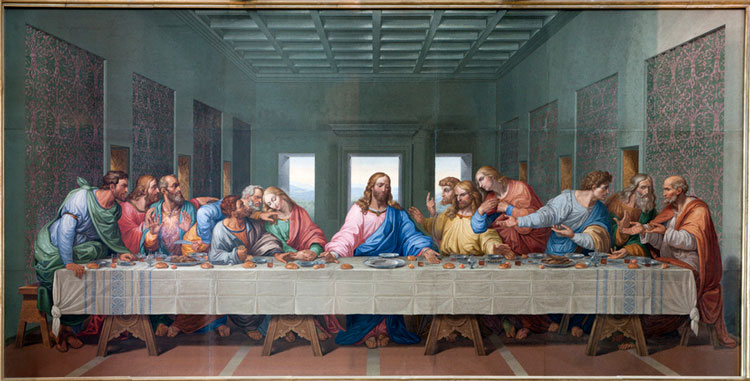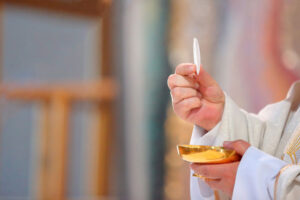
The Eucharist is the Christian ceremony during which bread and wine are consumed as the body and blood of Christ. The Eucharist is a re-enactment of Christ’s offering to the Apostles during the Last Supper and part of His testament to all followers that salvation shall be given to those who eat of his body and drink of his blood.
The Eucharist refers to the ceremony performed by all Christian denominations during which bread and wine are consecrated and then consumed in memory of the Last Supper. The ritual was described in Matthew, Mark, Luke, and Corinthians. Today, Christians continue to follow it as a remembrance of Christ’s promise, as he commanded.
And when he had given thanks, he broke it and said, “This is my body, which is for you; do this in remembrance of me.” In the same way, after supper he took the cup, saying, “This cup is the new covenant in my blood; do this, whenever you drink it, in remembrance of me.” For whenever you eat this bread and drink this cup, you proclaim the Lord’s death until he comes.
Explore a Christian Ministry Degree – Request More Info Today!
Featured Programs:Sponsored School(s)~ 1 Corinthians 11:24-26
The Eucharist is also known variously as:
- Holy Communion, or simply Communion
- The Lord's Supper
- Mass
- The Divine Liturgy
Though different denominations may call it different things or have a different idea what the Eucharist ceremony should look like, most consider it an important part of accepting His grace as a faithful Christian.
What is the meaning of Eucharist?
Eucharist comes from the Greek eucharistía, meaning “thanksgiving.”
The Celebration of the Eucharist Creates Great Debate among Christian Faiths
 Although the Eucharist is a consistent ceremonial offering made across Christian denominations, there are real differences in how the offering is characterized and performed. In fact, differences of interpretation of the nature of the Eucharist are the cause of several schisms in the church. There is an entire branch of theology devoted to study of the Eucharist and the meaning and rituals around it.
Although the Eucharist is a consistent ceremonial offering made across Christian denominations, there are real differences in how the offering is characterized and performed. In fact, differences of interpretation of the nature of the Eucharist are the cause of several schisms in the church. There is an entire branch of theology devoted to study of the Eucharist and the meaning and rituals around it.
A few denominations do not observe the Eucharist at all.
Supernatural Considerations Have Led To Schisms over the Eucharist
Historical disputes over the nature of the Eucharist revolve around how or whether the bread and wine become the flesh and blood of Christ.
- Consubstantiation - The belief that the real substance of Christ’s blood and body are commingled in the wine and bread as they are blessed prior to the Eucharist.
- Transubstantiation - The belief that through the blessing of clergy, bread and wine are physically transformed into the actual body and blood of Christ prior to administration of the Eucharist.
- Remembrance - This is the belief that bread and wine used in the Eucharist are merely symbolic, with no real presence of Christ in them.
Other faiths believe that Christ is present in the offering, but only in spiritual form. And some denominations take a nuanced view, not believing that either view is entirely true, but that some combination of the two is correct.
What Is the Celebration of the Eucharist Called In Different Denominations?
Depending on the church, the Eucharist may be considered as either a sacrament or an ordinance.
- What is the Sacrament of the Eucharist? A sacrament is a rite through which God’s grace is laid on an individual, involving divine blessing.
- What is the Ordinance of the Eucharist? A ritual demonstration of faith, not including any sort of divine interaction
All these different perspectives explain why the Eucharist as performed by some denominations is not accepted as valid by others. Since the ceremony is so closely tied to salvation in Biblical doctrine, this is an important point of study in many Christian degrees.
What is the Eucharist made of? What is the form of the Eucharist?
The Eucharist traditionally consists of bread and wine. Many denominations now offer grape juice as a non-alcoholic option. The bread may be leavened or unleavened according to tradition.
The bread is also sometimes referred to as Communion bread, a Eucharist wafer, or sometimes the Lamb or the host.
The wine is often called sacramental win, Communion wine, or altar wine.
Learning to properly bless the bread and wine to be used in the Eucharist, and how to administer the liturgy of the Eucharist are among the important skills taught in divinity and pastoral studies programs. In many denominations, only a fully ordained minister is allowed to perform these tasks.
There can be more than a dozen separate steps in the ceremony depending on the church. A formal education is critical in performing these steps properly.
What is the Significance of the Eucharist?
 The Eucharist is symbolic of an acceptance of Christ into the faithful. More importantly, Christ tells us directly that eternal salvation depends on accepting the Eucharist.
The Eucharist is symbolic of an acceptance of Christ into the faithful. More importantly, Christ tells us directly that eternal salvation depends on accepting the Eucharist.
Jesus said to them, “Very truly I tell you, unless you eat the flesh of the Son of Man and drink his blood, you have no life in you. Whoever eats my flesh and drinks my blood has eternal life, and I will raise them up at the last day.~ John 6:52-54
That makes the celebration of the Eucharist a key part of Christ’s promise and receiving the grace of God.
It’s also significant that many denominations restrict the administration of the Eucharist to only communicants who are in a state of grace. How that state of grace is defined also varies, from only those who are baptized to a longer list of requirements.
But as one of Christ’s most important and final commandments, the Eucharist is among the most sacred duties that pastors must perform.









